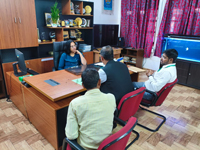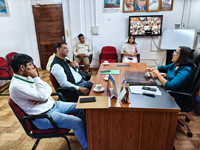
Collaborative initiative on Development of Estuarine Cage Culture Cluster in Goa
Collaborative initiative on Development of Estuarine Cage Culture Cluster in Goa
The Government of India has identified 34 aquaculture clusters across the country under the Pradhan Mantri Matsya Sampada Yojana (PMMSY), with Goa designated as an Estuarine Cage Culture Cluster. In connection with this initiative, a joint meeting was held between ICAR–Central Coastal Agricultural Research Institute (ICAR-CCARI), the Department of Fisheries (DoF), Government of Goa, and NABARD on 23rd October 2025 to deliberate on development of a roadmap for promotion of estuarine cage culture cluster in the state. The meeting was attended by Dr. Shamila Monteiro, Director of Fisheries, Goa, Shri. Chandrakant Velip, Dy. Director Fisheries, Dr. Smita Mazumdar, Dy. Director Fisheries, Shri. Chandan Shirodkar, Asst. Supdt. of Fisheries, Shri Vishwas Kadam, General Manager, NABARD, Goa and Shri Trivesh S. Mayekar, Scientist (FGB), ICAR-CCARI, Goa. Shri Vishwas Kadam briefed the meeting on the identification of aquaculture clusters under PMMSY and highlighted the potential for developing Goa as a model state for estuarine cage farming. Shri Trivesh S. Mayekar, presented the project proposal on the development of estuarine cage culture systems in Goa. He elaborated on the proposed target species, site selection criteria, cage design specifications, expected outcomes, and institutional roles. He emphasized the need for collaborative support from the Department of Fisheries for the successful implementation of the initiative. Dr. Shamila Monteiro suggested that after identifying suitable sites, the next step should focus on mobilizing interested farmers and creating awareness through preliminary training or exposure visits. She agreed that Directorate of Fisheries can conduct a training programme on estuarine cage culture. During discussions on the challenges in existing cage culture operations in Goa, it was discussed that high seed cost remains a major constraint in scaling up the activity. Institutional management and benefit-sharing among farmer groups are also key bottlenecks, as many individuals prefer operating independently rather than collectively. The need to form well-structured societies or cooperatives comprising farmers who are willing to share responsibilities and benefits in a transparent manner was emphasized during the discussion. ICAR-CCARI proposed that the Directorate of Fisheries may identify model locations for establishing estuarine cage culture demonstration units, to which Dr. Monteiro responded that Siridao, Chapora, and Thivim are potential candidate sites. NABARD suggested involving the State Rural Livelihood Mission (SRLM) for effective community mobilization and capacity building under the project. It was further discussed that an exposure visit for potential cage farmers should be organized to demonstrate the advantages of collective participation and cooperative aquaculture models. It was agreed that the initiative could initially be implemented in Cacra as a pilot model, which, if successful, can be replicated in other coastal areas of Goa. Concluding the discussion, a phased approach was agreed upon, beginning with an interaction meeting involving all existing and prospective cage farmers of Goa in collaboration with NABARD, DoF, and ICAR–CCARI, followed by an exposure visit to ICAR–CMFRI, Kochi. Prior to these activities, it was agreed to collect baseline data and identify gaps in the present cage culture practices in Goa to guide further interventions. In terms of financial assistance, DoF informed that under the Dharti Aaba Janjatiya Gram Utkarsh Abhiyan (DAJGUA) scheme, Scheduled Tribe (ST) beneficiaries located in eligible areas can avail up to 90% subsidy, while non-ST beneficiaries can receive up to 60% subsidy for establishing cage culture units. The initiative is expected to pave the way for sustainable, economically viable and climate resilient estuarine cage farming using technologies developed by ICAR, enhancing livelihood opportunities and nutritional security for coastal communities while supporting the national objectives of the Pradhan Mantri Matsya Sampada Yojana (PMMSY).

